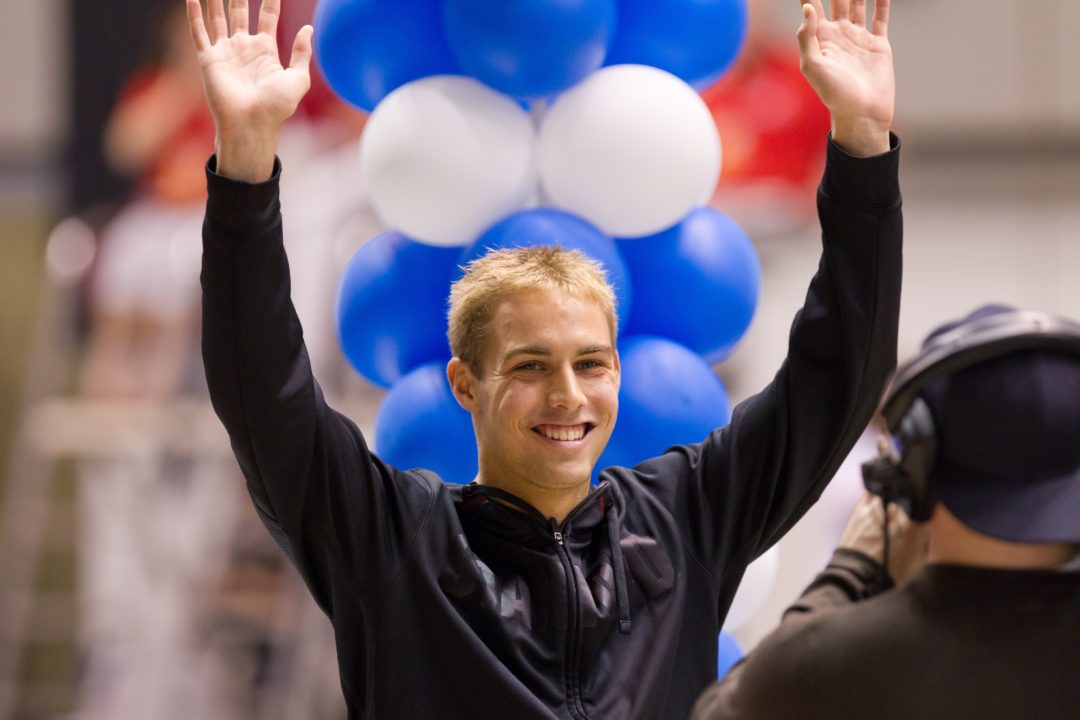With Nick McCrory and David Boudia focusing their full efforts on their specialty the platform (they teamed up to win the synchro platform on Thursday, and are each only entered in the platform individually), there was a big opening for two new divers to make the men’s Olympic Team in Friday’s only event final – the synchronized 3 meter.
The team that was able to take the biggest advantage of that was one of the more unlikely combinations of the meet: Kristian Ipsen and Troy Dumais. The two have become one of the most dominant tandems in the country, and with a score of 1296.21, kept alive a run of dominating major championships. The pair have now won every major US Championship in this event since the beginning of 2011 (including two Winter Nationals, a summer Nationals, a World Championship trials, and now an Olympic Trials).
The pair stumbled a bit on their 5th (of 6) dives in the final round, where Christopher Colwill and Drew Livingston pulled within 25 points, but with the veteran experience of Dumais in their back pocket, the champions put up an 87.72 in the last round to ensure that their opponents would get no closer. Livingston and Colwill finished 2nd in 1263.51, 33 points behind.
Ipsen and Dumais are perhaps unlikely because of the fast difference in age and experience. For the 32-year old Dumais, one of the elder-statesmen in the US National program, this will be a 4th Olympic berth – making him the only American man besides Greg Louganis to do so. For Ipsen, who will begin his sophomore season at Stanford this fall, it will be a first. But even for Dumais, this is an event that has not been his best throughout his career.
He didn’t even attempt qualification at the 2008 Olympic Trials in the synchro, despite being the individual champion in that event. He then hooked on with platform specialist Boudia for a brief time in 2009, with mixed results. But since he and Ipsen have paired up, they’ve been nearly unstoppable. Their final-round score of 420.21 would be competitive for a medal in London, though not nearly enough to challenge the dominant Chinese.
In this 3-meter synchro event, the name-of-the-game is consistency. Teams that hope to medal can recover from one mistake in finals in London, but only if they have 5 other big dives in their bag. The “big dives” is what cost the Americans, by just 5 points, in Beijing, and it’s what could cost this duo four years later.
The two scored their highest Degree of Difficulty was 3.5 (which is significant as it’s used as a point multiplier to decide a team’s final score). They have been toying with a front 2 ½ with 3 twists to install before London; though it offers a huge increase in difficulty (3.9), it would be risky to go to such a dive for the first time in major competition at the Olympic Games.
Also on this night, the women’s 10-meter platform was won by Ashley Buchter and Natalie Kalibat, both teenagers. However, the United States didn’t meet the Olympic qualifying standards in the event (countries earn spots in diving, not individual divers), so there were only two teams competing. The final was still exciting, with Buchter and Kalibat besting Allie Alter and Andrea Acquista from the Ohio State diving program by a mere 2.5 points.
On Saturday, two spots will be handed out in both the men’s 3-meter springboard final and the women’s 10-meter platform. Through the semi’s, Ipsen holds a sizable 40-point lead over his partner Dumais, but Colwill is nipping hot at their heels for a top-two spot and a return bid to the Olympics.
In the women’s 3-meter, former Miami Hurricane Brittany Viola holds the lead through the semi’s, with former Ohio State Buckeye Katherine Bell just 30 points back.
